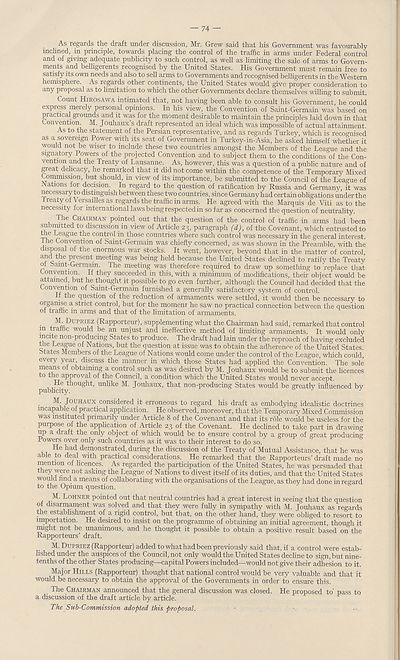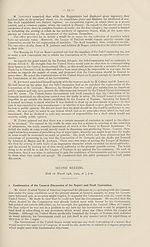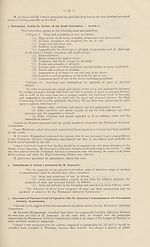Armament > Conference for the control of the international trade in arms, munitions and implements of war
(76)
Download files
Complete book:
Individual page:
Thumbnail gallery: Grid view | List view

— 74
As regards the draft under discussion, Mr. Grew said that his Government was favourably
inclined, in principle, towards placing the control of the traffic in arms under Federal control
and of giving adequate publicity to such control, as well as limiting the sale of arms to Govern¬
ments and belligerents recognised by the United States. His Government must remain free to
satisfy its own needs and also to sell arms to Governments and recognised belligerents in the Western
hemisphere. As regards other continents, the United States would give proper consideration to
any proposal as to limitation to which the other Governments declare themselves willing to submit.
Count Hirosawa intimated that, not having been able to consult his Government, he could
express merely personal opinions. In his view, the Convention of Saint-Germain was based on
practical grounds and it was for the moment desirable to maintain the principles laid down in that
Convention M. Jouhaux’s draft represented an ideal which was impossible of actual attainment.
As to the statement of the Persian representative, and as regards Turkey, which is recognised
as a sovereign Power with its seat of Government in Turkey-in-Asia, he asked himself whether it
would not be wiser to include these two countries amongst the Members of the League and the
signatory Powers of the projected Convention and to subject them to the conditions of the Con¬
vention and the Treaty of Lausanne. As, however, this was a question of a public nature and of
great delicacy, he remarked that it did not come within the competence of the Temporary Mixed
Commission, but should, in view of its importance, be submitted to the Council of the League of
Nations for decision. In regard to the question of ratification by Russia and Germany, it was
necessary to distinguish between these two countries, since Germany had certain obligations under the
Ireatyot Versailles as regards the traffic in arms. He agreed with the Marquis de Viti as to the
necessity for international laws being respected in so far as concerned the question of neutrality.
The Chairman pointed out that the question of the control of traffic in arms had been
submitted to discussion in view of Article 23, paragraph (d), of the Covenant, which entrusted to
he League the control in those countries where such control was necessary in the general interest,
the Convention of Saint-Germain was chiefly concerned, as was shown in the Preamble with the
disposal of the enormous war stocks. It went, however, beyond that in the matter of control
and the present meeting was being held because the United States declined to ratify the Treaty
of Saint-Germain. The meeting was therefore required to draw up something to replace that
Convention. If they succeeded in this, with a minimum of modifications, their object would be
attained, but he thought it possible to go even further, although the Council had decided that the
Convention of Samt-Germam furnished a generally satisfactory system of control.
If the question of the reduction of armaments were settled, it would then be necessary to
organise a strict control, but for the moment he saw no practical connection between the question
of traffic m arms and that of the limitation of armaments.
• x ^DuPRIfjZ (RaPPorte.ur)> supplementing what the Chairman had said, remarked that control
m traffic would be an unjust and ineffective method of limiting armaments. It would only
incite non-producing States to produce. The draft had lain under the reproach of having excluded
the League of Nations, but the question at issue was to obtain the adherence of the United States.
Mates Members of the League of Nations would come under the control of the League, which could,
every year, discuss the manner in which those States had applied the Convention. The sole
means of obtaining a control such as was desired by M. Jouhaux would be to submit the licences
to the approval of the Council, a condition which the United States would never accept.
publiffityh0Ught’ Unlike M‘ J0llhaux> that non-producing States would be greatly influenced by
Mu/0IiHAUX C°nsidered [t erroneous to regard his draft as embodying idealistic doctrines
incapable of practical application. He observed, moreover, that the Temporary Mixed Commission
was instituted primarily under Article 8 of the Covenant and that its role would be useless for the
purpose of the application of Article 23 of the Covenant. He declined to take part in drawing
up a draft the only object of which would be to ensure control by a group of great producing
Powers over only such countries as it was to their interest to do so.
He had demonstrated, during the discussion of the Treaty of Mutual Assistance, that he was
able to deal with practical considerations. He remarked that the Rapporteurs’draft made no
mention of licences. As regarded the participation of the United States, he was persuaded that
they were not asking the League of Nations to divest itself of its duties, and that the United States
would find a means of collaborating with the organisations of the League, as they had done in regard
to the Opium question.
M. Lohner pointed out that neutral countries had a great interest in seeing that the question
of disarmament was solved and that they were fully in sympathy with M. Jouhaux as regards
the establishment of a rigid control, but that, on the other hand, they were obliged to resort to
importation. He desired to insist on the programme of obtaining an initial agreement, though it
might not be unanimous, and he thought it possible to obtain a positive result based on the
Rapporteurs’ draft.
M. Dupriez (Rapporteur) added to what had been previously said that, if a control were estab¬
lished under the auspices of the Council, not only would the United States decline to sign, but nine-
tenths of the other States producing—capital Powers included—would not give their adhesion to it.
Major Hills (Rapporteur) thought that national control would be very valuable and that it
would be necessary to obtain the approval of the Governments in order to ensure this.
The Chairman announced that the general discussion was closed. He proposed to' pass to
a discussion of the draft article by article.
The Sub-Commission adopted this proposal. ■ ■ ....
As regards the draft under discussion, Mr. Grew said that his Government was favourably
inclined, in principle, towards placing the control of the traffic in arms under Federal control
and of giving adequate publicity to such control, as well as limiting the sale of arms to Govern¬
ments and belligerents recognised by the United States. His Government must remain free to
satisfy its own needs and also to sell arms to Governments and recognised belligerents in the Western
hemisphere. As regards other continents, the United States would give proper consideration to
any proposal as to limitation to which the other Governments declare themselves willing to submit.
Count Hirosawa intimated that, not having been able to consult his Government, he could
express merely personal opinions. In his view, the Convention of Saint-Germain was based on
practical grounds and it was for the moment desirable to maintain the principles laid down in that
Convention M. Jouhaux’s draft represented an ideal which was impossible of actual attainment.
As to the statement of the Persian representative, and as regards Turkey, which is recognised
as a sovereign Power with its seat of Government in Turkey-in-Asia, he asked himself whether it
would not be wiser to include these two countries amongst the Members of the League and the
signatory Powers of the projected Convention and to subject them to the conditions of the Con¬
vention and the Treaty of Lausanne. As, however, this was a question of a public nature and of
great delicacy, he remarked that it did not come within the competence of the Temporary Mixed
Commission, but should, in view of its importance, be submitted to the Council of the League of
Nations for decision. In regard to the question of ratification by Russia and Germany, it was
necessary to distinguish between these two countries, since Germany had certain obligations under the
Ireatyot Versailles as regards the traffic in arms. He agreed with the Marquis de Viti as to the
necessity for international laws being respected in so far as concerned the question of neutrality.
The Chairman pointed out that the question of the control of traffic in arms had been
submitted to discussion in view of Article 23, paragraph (d), of the Covenant, which entrusted to
he League the control in those countries where such control was necessary in the general interest,
the Convention of Saint-Germain was chiefly concerned, as was shown in the Preamble with the
disposal of the enormous war stocks. It went, however, beyond that in the matter of control
and the present meeting was being held because the United States declined to ratify the Treaty
of Saint-Germain. The meeting was therefore required to draw up something to replace that
Convention. If they succeeded in this, with a minimum of modifications, their object would be
attained, but he thought it possible to go even further, although the Council had decided that the
Convention of Samt-Germam furnished a generally satisfactory system of control.
If the question of the reduction of armaments were settled, it would then be necessary to
organise a strict control, but for the moment he saw no practical connection between the question
of traffic m arms and that of the limitation of armaments.
• x ^DuPRIfjZ (RaPPorte.ur)> supplementing what the Chairman had said, remarked that control
m traffic would be an unjust and ineffective method of limiting armaments. It would only
incite non-producing States to produce. The draft had lain under the reproach of having excluded
the League of Nations, but the question at issue was to obtain the adherence of the United States.
Mates Members of the League of Nations would come under the control of the League, which could,
every year, discuss the manner in which those States had applied the Convention. The sole
means of obtaining a control such as was desired by M. Jouhaux would be to submit the licences
to the approval of the Council, a condition which the United States would never accept.
publiffityh0Ught’ Unlike M‘ J0llhaux> that non-producing States would be greatly influenced by
Mu/0IiHAUX C°nsidered [t erroneous to regard his draft as embodying idealistic doctrines
incapable of practical application. He observed, moreover, that the Temporary Mixed Commission
was instituted primarily under Article 8 of the Covenant and that its role would be useless for the
purpose of the application of Article 23 of the Covenant. He declined to take part in drawing
up a draft the only object of which would be to ensure control by a group of great producing
Powers over only such countries as it was to their interest to do so.
He had demonstrated, during the discussion of the Treaty of Mutual Assistance, that he was
able to deal with practical considerations. He remarked that the Rapporteurs’draft made no
mention of licences. As regarded the participation of the United States, he was persuaded that
they were not asking the League of Nations to divest itself of its duties, and that the United States
would find a means of collaborating with the organisations of the League, as they had done in regard
to the Opium question.
M. Lohner pointed out that neutral countries had a great interest in seeing that the question
of disarmament was solved and that they were fully in sympathy with M. Jouhaux as regards
the establishment of a rigid control, but that, on the other hand, they were obliged to resort to
importation. He desired to insist on the programme of obtaining an initial agreement, though it
might not be unanimous, and he thought it possible to obtain a positive result based on the
Rapporteurs’ draft.
M. Dupriez (Rapporteur) added to what had been previously said that, if a control were estab¬
lished under the auspices of the Council, not only would the United States decline to sign, but nine-
tenths of the other States producing—capital Powers included—would not give their adhesion to it.
Major Hills (Rapporteur) thought that national control would be very valuable and that it
would be necessary to obtain the approval of the Governments in order to ensure this.
The Chairman announced that the general discussion was closed. He proposed to' pass to
a discussion of the draft article by article.
The Sub-Commission adopted this proposal. ■ ■ ....
Set display mode to:
![]() Universal Viewer |
Universal Viewer | ![]() Mirador |
Large image | Transcription
Mirador |
Large image | Transcription
Images and transcriptions on this page, including medium image downloads, may be used under the Creative Commons Attribution 4.0 International Licence unless otherwise stated. ![]()
| League of Nations > Armament > Conference for the control of the international trade in arms, munitions and implements of war > (76) |
|---|
| Permanent URL | https://digital.nls.uk/195382751 |
|---|
| Shelfmark | LN.IX |
|---|
| Description | Over 1,200 documents from the non-political organs of the League of Nations that dealt with health, disarmament, economic and financial matters for the duration of the League (1919-1945). Also online are statistical bulletins, essential facts, and an overview of the League by the first Secretary General, Sir Eric Drummond. These items are part of the Official Publications collection at the National Library of Scotland. |
|---|---|
| Additional NLS resources: |
|

